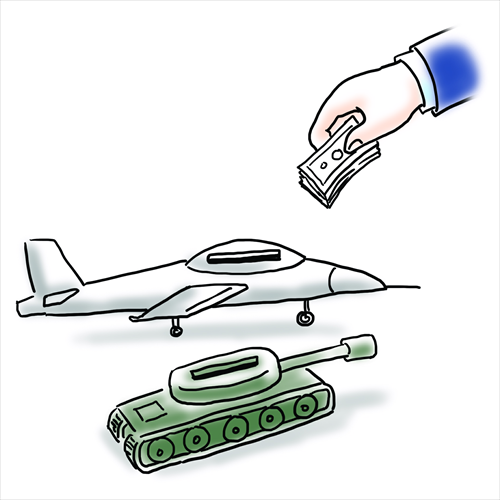Why China needs defense budget raise

Illustration: Shen Lan /GT
Among all the heated discussions over the Two Sessions, China's defense budget has attracted the most attention. This is not unusual, because on the path of the nation's peaceful rise, becoming powerful is consistent with a strengthened military.
Generally speaking, China's national defense and armed forces have a weak foundation. For the moment, the country is trying to improve its defense power to match China's prosperity, major power status, and to cope with current situation of international politics and military affairs more calmly via national defense and military reforms.
All this demands that our defense budget should keep an appropriate pace of growth both now and in the future. This year, for example, the military budget in certain fields needs increasing.
To start with, the current military reform is unprecedented. It requires not only reductions in troop numbers, but also major adjustments to military structures and innovation for combat forces involved in information warfare. Strong support for the military budget is needed for such huge reform and changes.
In order to establish a new theater command system, the original C4ISR (command and control) system will need to be changed, which means a series of IT adjustments, command links and other changes in military technology in each command organization will take place.
The retirement of 300,000 personnel also requires more funds. This time, mainly non-combatants will be cut, such as military officers and civilian personnel. Suppose there are around 200,000 military officers and sergeants in total among them, most of whom would choose their future career independently. If each was paid a subsidy of 300,000 yuan ($46,110), the country needs to pay 60 billion yuan altogether.
Purchasing equipment is another part of the budget. The more advanced the equipment, the more expensive it is. A Chinese type 59 tank cost 600,000 yuan in 1985, but a current type 96 costs 6 million yuan, and a type 99 costs 18 million yuan. This is only one of the examples.
The nature of China's future warfare will be defensive. Given China's strategic policies and operational plans, training exercises to strengthen operational capability are necessary in times of peace. The process will be long in general, yet in hot spots where military conflicts might break out, every minute counts.
For instance, China can set up a radar warning network in the Air Defense Identification Zone (ADIZ) in the East China Sea and other regions that may have an ADIZ in the future. After China's battle zones were unveiled, the next step is to integrate military resources, train operational capability in the main battle field, and strengthen battle field constructions on land, sea and air. And it needs a large sum of money.
Moreover, education and training is also part of the expenditure. Some foreign media and military experts always argue that Chinese armed forces lack training. Why is that? This is mainly due to too small a military budget.
Take fight training, fighter pilots from the US and Japan normally spend 180 to 240 hours in the air per year, while ours fly only a bit more than 100 hours each year. This intensified and difficult training requires forceful support from the military budget.
China's defense budget in 2015 was 872 billion yuan or $141 billion, while the US allocated $598.5 billion, four times as much as that of China's. Given its strong military power, the US is now squeezing China's surrounding strategic environment, paving ways for its rebalance to the Asia-Pacific policy. It has severely influenced our national security.
An appropriate, limited increase in China's military budget in 2016 can be afforded by the national economy. In the next 10 years, sustained growth in the defense budget is also predictable, because that is the prerequisite and guarantee of the nation's safety, dignity, and peaceful emergence.
The author is a member of the National Committee of the 12th Chinese People's Political Consultative Conference, and former deputy commander of the Nanjing military region. opinion@globaltimes.com.cn